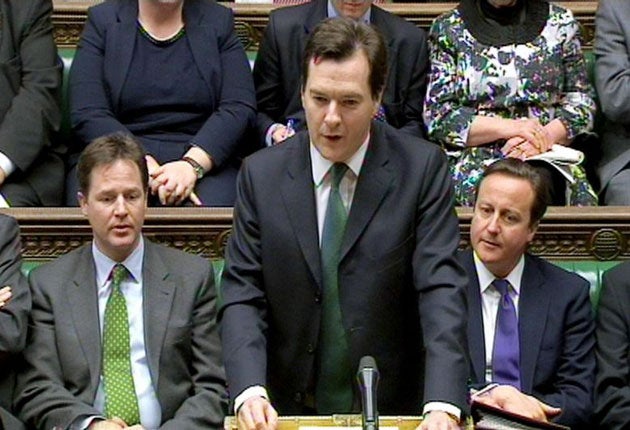Britain set for 'sluggish' climb out of recession

Support truly
independent journalism
Our mission is to deliver unbiased, fact-based reporting that holds power to account and exposes the truth.
Whether $5 or $50, every contribution counts.
Support us to deliver journalism without an agenda.

Louise Thomas
Editor
The prospects for Britain's economy remain "inherently uncertain" and the return to growth will be "relatively sluggish", the independent fiscal watchdog has warned.
The Office of Budget Responsibility (OBR) said the economy "will continue to recover from the recession, but at a slower pace than in the recessions of the 1970s, 1980s and 1990s".
George Osborne, the Chancellor, seized on the positive aspects of the OBR report as evidence that the recovery is "on track". The watchdog upgraded its prediction in June that the economy would grow by 1.2 per cent this year to 1.8 per cent, but downgraded next year's growth forecast from 2.3 to 2.1 per cent.
It said 160,000 fewer public sector jobs would be lost over the next four years than the 490,000 it forecast in June, largely because of the Government's decision to cut the welfare budget rather than other Whitehall departments. It predicted a net increase of one million jobs because of those created in the private sector.
In his Autumn Statement to the Commons, Mr Osborne said: "Britain is on the mend... It is clear that our decisive actions have proved to the world that Britain can live within her means." He said Labour's call for the deficit to be reduced more slowly would "put us back into the international firing line".
The Chancellor said the OBR's central view was that "there will be no double-dip recession". However, the OBR conceded that there was a 10 per cent chance of the economy undergoing a "double dip" next year. Robert Chote, the body's chairman, said it was "not impossible", but would not derail the relatively slow recovery in the medium term. The report suggested that Mr Osborne will have a £6bn budget surplus on his hands by 2015-16, which Tory MPs hope could be used to promise tax cuts at the general election due in May 2015.
Labour argued the report showed that unemployment, which will peak at 8 per cent next year, would be as high at the end of this parliament as it was when the global financial crisis erupted in 2008. Alan Johnson, the shadow Chancellor, accused Mr Osborne of taking a "reckless gamble" by cutting the deficit so quickly. "For families up and down the country, a jobless recovery is no recovery at all," he said.
Even if the economy improves, households face a tough 2011. The OBR says house prices will drop by 3.1 per cent. With inflation high, VAT rising to 20 per cent in January, national insurance higher and only modest pay rises, it promises to be one of the tightest squeezes on living standards since the Second World War. Pre-empting critics who claim that the Chancellor's strategy could be knocked off course if the economy fails to grow as quickly as hoped, the OBR published stress-tested forecasts, based either on a delayed rebalancing towards exports or persistently weak demand at home.
Even with a much more pessimistic outlook, the OBR judged that the Government would have a "better than 50 per cent chance" of meeting its "fiscal mandate" and eliminating the deficit by 2015.
Some economists warned that the OBR may still be overestimating the strength of the recovery. The National Institute for Economic and Social Research, the country's oldest economics think-tank, said: "We think their projection is still too strong given the weak prospects for Europe. The OBR calculates the chance of the economy contracting next year is around one in 10. We think the chance is closer to one in six." Vicky Redwood of Capital Economics said: "The report is hardly a vote of confidence. It will now be harder to claim that the spending cuts are not set to undermine economic growth."
Has the Chancellor been vindicated?
* According to the latest Wikileaks revelations, the Governor of the Bank of England, Mervyn King, once referred to George Osborne's "lack of depth", presumably in front of an American diplomat. If true, Mr King was merely reflecting the received wisdom of a few months ago, which marked the Chancellor as the "weakest link" in the Tory chain.
Times change, and the Chancellor might have been more right than wrong. Just as the Conservatives (and it seems Mr King, privately) argued, early "in year" cuts in public spending of £6bn have indeed delivered a sizeable return in market confidence, as has Mr Osborne's plan for a faster and deeper attack on the budget deficit than that planned by Labour. Mr Osborne's success in bolstering foreign investors' confidence has come at the expense of domestic consumer and business confidence, but the strength of the latest OBR forecasts shows that that hasn't, yet, poleaxed the recovery.
There remain risks. Almost all of the deficit reduction programme remains on paper and still to be implemented.
The recent concession on delaying the housing benefit reforms, albeit welcome, suggests that some of the Treasury's plans will prove politically unfeasible and even impractical in any orderly way, given the scale of the cuts and the resistance they will surely face. We will soon discover the depth of Mr Osborne's courage and determination.
sean o'grady, economics editor
Subscribe to Independent Premium to bookmark this article
Want to bookmark your favourite articles and stories to read or reference later? Start your Independent Premium subscription today.
Join our commenting forum
Join thought-provoking conversations, follow other Independent readers and see their replies
Comments